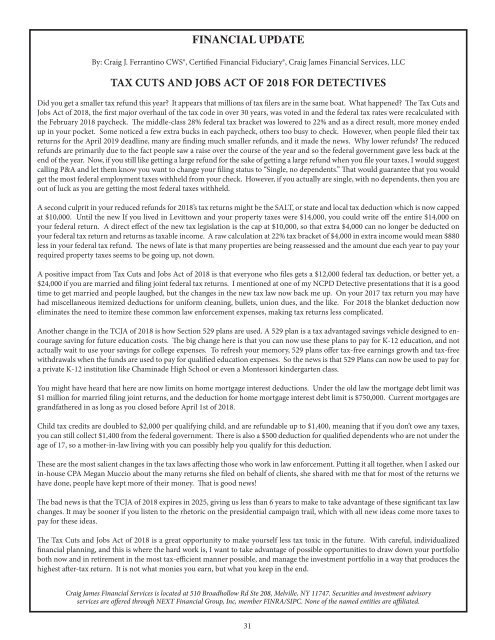SquealDeskMay2019proof4-compressed
Create successful ePaper yourself
Turn your PDF publications into a flip-book with our unique Google optimized e-Paper software.
FINANCIAL UPDATE<br />
By: Craig J. Ferrantino CWS®, Certified Financial Fiduciary®, Craig James Financial Services, LLC<br />
TAX CUTS AND JOBS ACT OF 2018 FOR DETECTIVES<br />
Did you get a smaller tax refund this year? It appears that millions of tax filers are in the same boat. What happened? The Tax Cuts and<br />
Jobs Act of 2018, the first major overhaul of the tax code in over 30 years, was voted in and the federal tax rates were recalculated with<br />
the February 2018 paycheck. The middle-class 28% federal tax bracket was lowered to 22% and as a direct result, more money ended<br />
up in your pocket. Some noticed a few extra bucks in each paycheck, others too busy to check. However, when people filed their tax<br />
returns for the April 2019 deadline, many are finding much smaller refunds, and it made the news. Why lower refunds? The reduced<br />
refunds are primarily due to the fact people saw a raise over the course of the year and so the federal government gave less back at the<br />
end of the year. Now, if you still like getting a large refund for the sake of getting a large refund when you file your taxes, I would suggest<br />
calling P&A and let them know you want to change your filing status to “Single, no dependents.” That would guarantee that you would<br />
get the most federal employment taxes withheld from your check. However, if you actually are single, with no dependents, then you are<br />
out of luck as you are getting the most federal taxes withheld.<br />
A second culprit in your reduced refunds for 2018’s tax returns might be the SALT, or state and local tax deduction which is now capped<br />
at $10,000. Until the new If you lived in Levittown and your property taxes were $14,000, you could write off the entire $14,000 on<br />
your federal return. A direct effect of the new tax legislation is the cap at $10,000, so that extra $4,000 can no longer be deducted on<br />
your federal tax return and returns as taxable income. A raw calculation at 22% tax bracket of $4,000 in extra income would mean $880<br />
less in your federal tax refund. The news of late is that many properties are being reassessed and the amount due each year to pay your<br />
required property taxes seems to be going up, not down.<br />
A positive impact from Tax Cuts and Jobs Act of 2018 is that everyone who files gets a $12,000 federal tax deduction, or better yet, a<br />
$24,000 if you are married and filing joint federal tax returns. I mentioned at one of my NCPD Detective presentations that it is a good<br />
time to get married and people laughed, but the changes in the new tax law now back me up. On your 2017 tax return you may have<br />
had miscellaneous itemized deductions for uniform cleaning, bullets, union dues, and the like. For 2018 the blanket deduction now<br />
eliminates the need to itemize these common law enforcement expenses, making tax returns less complicated.<br />
Another change in the TCJA of 2018 is how Section 529 plans are used. A 529 plan is a tax advantaged savings vehicle designed to encourage<br />
saving for future education costs. The big change here is that you can now use these plans to pay for K-12 education, and not<br />
actually wait to use your savings for college expenses. To refresh your memory, 529 plans offer tax-free earnings growth and tax-free<br />
withdrawals when the funds are used to pay for qualified education expenses. So the news is that 529 Plans can now be used to pay for<br />
a private K-12 institution like Chaminade High School or even a Montessori kindergarten class.<br />
You might have heard that here are now limits on home mortgage interest deductions. Under the old law the mortgage debt limit was<br />
$1 million for married filing joint returns, and the deduction for home mortgage interest debt limit is $750,000. Current mortgages are<br />
grandfathered in as long as you closed before April 1st of 2018.<br />
Child tax credits are doubled to $2,000 per qualifying child, and are refundable up to $1,400, meaning that if you don’t owe any taxes,<br />
you can still collect $1,400 from the federal government. There is also a $500 deduction for qualified dependents who are not under the<br />
age of 17, so a mother-in-law living with you can possibly help you qualify for this deduction.<br />
These are the most salient changes in the tax laws affecting those who work in law enforcement. Putting it all together, when I asked our<br />
in-house CPA Megan Muccio about the many returns she filed on behalf of clients, she shared with me that for most of the returns we<br />
have done, people have kept more of their money. That is good news!<br />
The bad news is that the TCJA of 2018 expires in 2025, giving us less than 6 years to make to take advantage of these significant tax law<br />
changes. It may be sooner if you listen to the rhetoric on the presidential campaign trail, which with all new ideas come more taxes to<br />
pay for these ideas.<br />
The Tax Cuts and Jobs Act of 2018 is a great opportunity to make yourself less tax toxic in the future. With careful, individualized<br />
financial planning, and this is where the hard work is, I want to take advantage of possible opportunities to draw down your portfolio<br />
both now and in retirement in the most tax-efficient manner possible, and manage the investment portfolio in a way that produces the<br />
highest after-tax return. It is not what monies you earn, but what you keep in the end.<br />
Craig James Financial Services is located at 510 Broadhollow Rd Ste 208, Melville, NY 11747. Securities and investment advisory<br />
services are offered through NEXT Financial Group, Inc, member FINRA/SIPC. None of the named entities are affiliated.<br />
31



